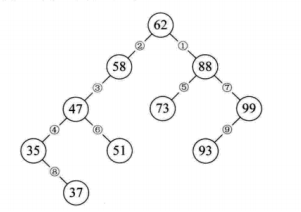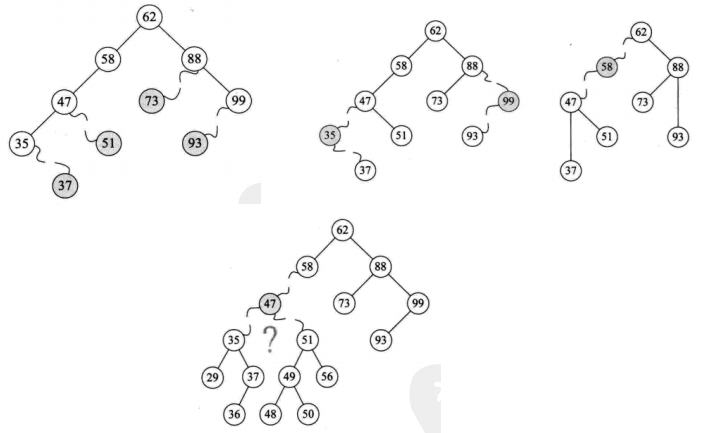数据结构|-二叉查找树(二叉搜索树)的链式存储结构的实现
二叉排序树,又称为二叉查找树。
它或者是一棵空树,或者是具有下列性质的二叉树。
- 若它的左子树不为空,则左子树上所有的结点的值均小于根结构的值;
- 若它的右子树不为空,则右字数上所有结点的值均大于它的根结点的值;
- 它的左右子树也分别为二叉排序树。
优点:
- 1,排序方便
- 2,方便查找
- 3,方便插入和删除

二叉排序树的插入数据:
因为二叉排序树中所有的数都符合排序树的特点,所以任意插入一个数时,都能在遍历树的过程中找到其应该放置的正确位置
二叉排序树的删除数据:
三种情况:
- 1,叶子结点:直接删除该叶子(置空)
- 2,仅有左子树或者右子数的结点:将其子树的值赋给结点,删除这个子树
- 3,左右子树都有:找到结点的右子树中最小的结点(左子树的左的……的左子树)赋值给待删结点,然后删除那个最小的结点

代码部分:
using System; using System.Collections.Generic; using System.Linq; using System.Text; using System.Threading.Tasks; namespace TestFun4 { class Program { static void Main(string[] args) { BSTree tree = new BSTree(); int[] data = { 62, 58, 88, 47, 73, 99, 35, 51, 93, 37 }; foreach (int item in data) { //将数组中的数装进树中去 tree.Add(item); } Console.WriteLine("树的中序遍历:"); tree.MiddleTravelsal(); Console.WriteLine(); Console.WriteLine("99是否存在树中:" + tree.Find(99)); Console.WriteLine("11是否存在树中:" + tree.Find(11)); tree.Delete(35); Console.WriteLine("删除35之后的中序遍历"); tree.MiddleTravelsal(); Console.WriteLine(); tree.Delete(62); Console.WriteLine("删除62之后的中序遍历"); tree.MiddleTravelsal(); Console.ReadKey(); } } /// <summary> /// 结点类、存储该结点的左子树、右子树、父亲 /// </summary> class BSNode { public BSNode LeftChild { get; set; } public BSNode RightChild { get; set; } public BSNode Parent { get; set; } public int Data { get; set; } public BSNode() { } public BSNode(int item) { this.Data = item; } } class BSTree { BSNode root = null; //添加数据 public void Add(int item) { //以该数据创建一个新结点 BSNode newNode = new BSNode(item); //如果根节点为空,直接让插入的数据成为根节点 if (root == null) { root = newNode; } else { BSNode temp = root; //遍历整棵树找到最适合插入数据的位置 while (true) { if (item >= temp.Data)//放在temp右边 { if (temp.RightChild == null)//如果temp无右子树,就把newnode作为temp的右子树 { temp.RightChild = newNode; newNode.Parent = temp; break; } else//否则继续往下遍历 { temp = temp.RightChild; } } else//放在temp左边 { if (temp.LeftChild == null) { temp.LeftChild = newNode; newNode.Parent = temp; break; } else { temp = temp.LeftChild; } } } } } //中序遍历(中序遍历就是二叉排序树的从小到大排序) public void MiddleTravelsal() { MiddleTravelsal(root); } private void MiddleTravelsal(BSNode node) { if (node == null) return; MiddleTravelsal(node.LeftChild); Console.Write(node.Data + " "); MiddleTravelsal(node.RightChild); } //判断树中是否已存在item这个值 public bool Find(int item) { BSNode temp = root; while (true) { if (temp == null) return false; if (temp.Data == item) return true; if (item > temp.Data) temp = temp.RightChild; else temp = temp.LeftChild; } } //删除某个值所在的结点 public bool Delete(int item) { BSNode temp = root; while (true) { //temp==null表示树中没有找到该值,返回false表示删除失败 if (temp == null) return false; if (temp.Data == item) { DeleteNode(temp); return true; } if (item > temp.Data) temp = temp.RightChild; else temp = temp.LeftChild; } } //删除结点的具体操作 private void DeleteNode(BSNode node) { //情况1:要删除的结点没有左右子树 if (node.LeftChild == null && node.RightChild == null) { if (node.Parent == null)//删除根结点 root = null; else if (node.Parent.LeftChild == node)//要删除的结点是其父亲的左子树时候 node.Parent.LeftChild = null;//删除左子树就是删除该结点 else if (node.Parent.RightChild == node)//右子树的情况 node.Parent.RightChild = null; return; } //情况2:要删除的结点有右子树没有左子树 if (node.LeftChild == null && node.RightChild != null) { node.Data = node.RightChild.Data;//将其右子树作为被删除的这个结点 node.RightChild = null; return; } //情况3:要删除的结点有左子树没有右子树 if (node.LeftChild != null && node.RightChild == null) { node.Data = node.LeftChild.Data; node.LeftChild = null; return; } //情况4:要删除的结点有左右两个子树 BSNode temp = node.RightChild;//找到右子树所包含的所有结点中最小的结点替换现在的结点 while (true) { //左子树的左子树的左子树的…的左子树就是整个子树中最小的结点 if (temp.LeftChild != null) temp = temp.LeftChild; else break; } node.Data = temp.Data;//数值替换 DeleteNode(temp);//递归调用:把temp这个结点删除(因为temp无子树,所以会递归到情况1来删除这个结点) } } }
结果:






